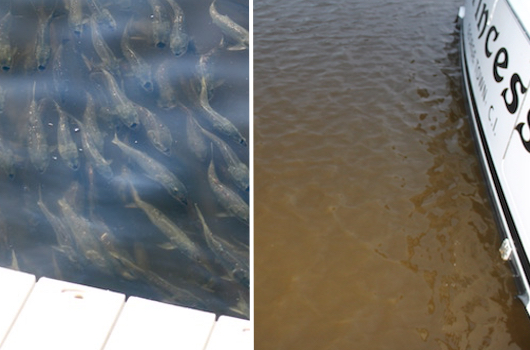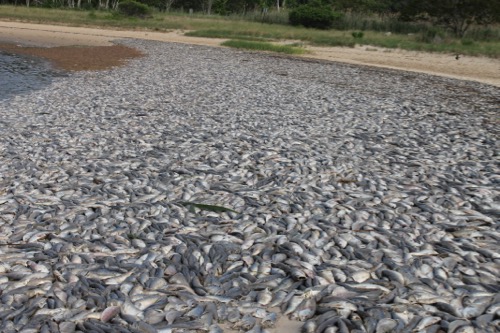News
Peconic River is turning brown with dense ‘mahogany tide,’ algal bloom blamed in last year’s massive bunker fish kills
Mahogany tide, responsible for last year’s historic bunker fish kills, is back in the Peconic River this spring, already matching last year's record levels despite cool water temperatures, and turning local waterways a murky reddish-brown.
News
Riverhead’s cardboard boat races postponed due to massive fish kills, Peconic River’s poor water quality
Riverhead's popular cardboard boat races, held in the Peconic River each June have bene postponed to Aug. 23, due to the recent massive fish kills and resulting poor water quality, which prompted an advisory from county health officials yesterday.
News
Q&A: Why are the fish dying?
A video Q&A explaining the bunker fish kills in western Flanders Bay and the Peconic River.
News
Officials plan steps to remove rotting fish, hoping for help from Mother Nature
As complaints begin to flow in about the tide of dead fish washing ashore on Flanders Bay beaches, local officials are making plans to remove at least the biggest piles of fish carcasses from local beaches, including the county park.
News
Fishy stench hangs over deserted Flanders Bay beaches as dead bunker continue to wash ashore
Dead bunker continue to wash ashore on the beaches of Flanders Bay in Riverhead and are now appearing east of there, along Peconic Bay...
News
Marine research scientist: ‘Mahogany tide’ algal bloom caused fish kill in Peconic Estuary
A fish kill of major proportions is underway in the Peconic Estuary, the result of a harmful algal bloom known as 'mahogany tide.'
News
As thousands of dead bunker wash ashore, Riverhead seeks fishermen with siene nets to help avoid ‘major’ kill
Town hopes fishermen with drag net capabilities can remove live bait fish from the bay before they all die off because oxygen levels in the water are too low to sustain life.






































